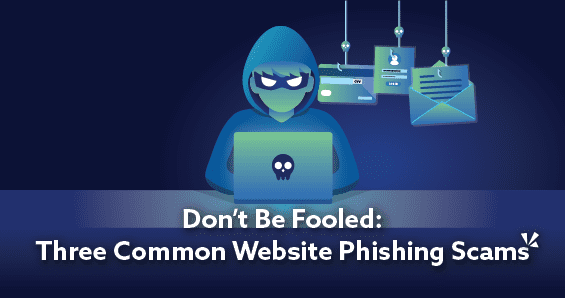Don’t Be Fooled: Three Common Website Phishing Scams

Don’t get fooled by common phishing scams.
We frequently get asked by clients “Is this a scam?” The truth is that it can be tough to spot a scam, because many scam companies sound reputable. For that reason, it can be helpful to know the warning signs and be aware of common scam tactics.
If you think you’ve received a scam call, email or letter relating to your website, a good rule of thumb is to reach out to your Account Manager.
So, what does a scam look like? Below are three examples of the most common scams we see.
1. Copyright Claim
Have you received an email from the contact form on your website from someone threatening to sue you over a copyright infringement? This is a common copyright claim scam. These messages are typically from someone claiming to be a licensed photographer or illustrator, and they say that you’ve used their copyrighted images on your website.
Here’s an example of what the message might look like:
“This is Meleena and I am a licensed photographer.I was puzzled, putting it lightly, when I saw my images at your website. If you use a copyrighted image without an owner’s license, you should be aware that you could be sued by the copyright holder.It’s unlawful to use stolen images and it’s so low!Take a look at this document with the links to my images you used at www.yourdomain.com and my earlier publications to obtain the evidence of my ownership.Download it now and check this out for yourself:If you don’t remove the images mentioned in the document above during the next several days, I’ll file a complaint on you to your hosting provider stating that my copyrights have been severely infringed and I am trying to protect my intellectual property. And if it doesn’t work, you may be pretty damn sure I am going to take legal action against you! And I won’t give you a prior notice again.”
What to watch for:
- Messages that threaten legal action
- Spoofed email addresses
- Spelling or grammar errors
- Suspicious links
The goal of this common scam is to scare people into clicking the link in the message. Whatever you do, don’t click the link! This can cause viruses and security issues on your device, and can also give the scammer access to your sensitive payment information.
2. Domain Renewal
This scam involves receiving a warning from a third-party company that you need to renew your domain. They’ll often send a fake invoice and request immediate payment, claiming your domain name will expire if you don’t send them money.
What to watch for:
- Invoices from a company you don’t recognize the name of
- Requests for immediate payment
- Spelling or grammar errors
The goal of the domain renewal scam is for these companies to gain access to your payment information, and ultimately steal your domain too. For most of our clients, we take care of the domain registration and renewal. If you encounter a sketchy situation like this, you can disregard it – we’ve got you covered!
3. Google Call
Have you gotten a strange call from someone claiming to work “for” or “with” Google? These scam calls come from third-party companies, and their goal is to coerce you into paying them. These companies target Google My Business listing owners and will try to get you to buy services that either Google provides for free or that don’t exist at all. The person on the phone may claim they can boost your search rankings or perform other site optimization services (for a price, of course). These scammers may also threaten to remove your business’s listing from Google Search and Maps if you don’t pay a renewal fee.
What to watch for:
- Calls that lead with “I’m calling on behalf of Google” or similar claims
- Threats to remove your business’s listing
- Requests for immediate payment
- Requests for personal information
The biggest red flag with this scam is that they will probably request personal information from you, such as your password or payment info. If a real Google employee is calling you, they won’t be asking for this sensitive information!
While it can often be tough to tell if something is a scam, it’s always important to have a skeptical eye. When in doubt – do not click on any links or send money to anyone. If you ever receive an email, call, or piece of mail relating to your website that you’re concerned about, please contact Pinnacle Marketing Group or reach out to your account manager. We are here to help you!